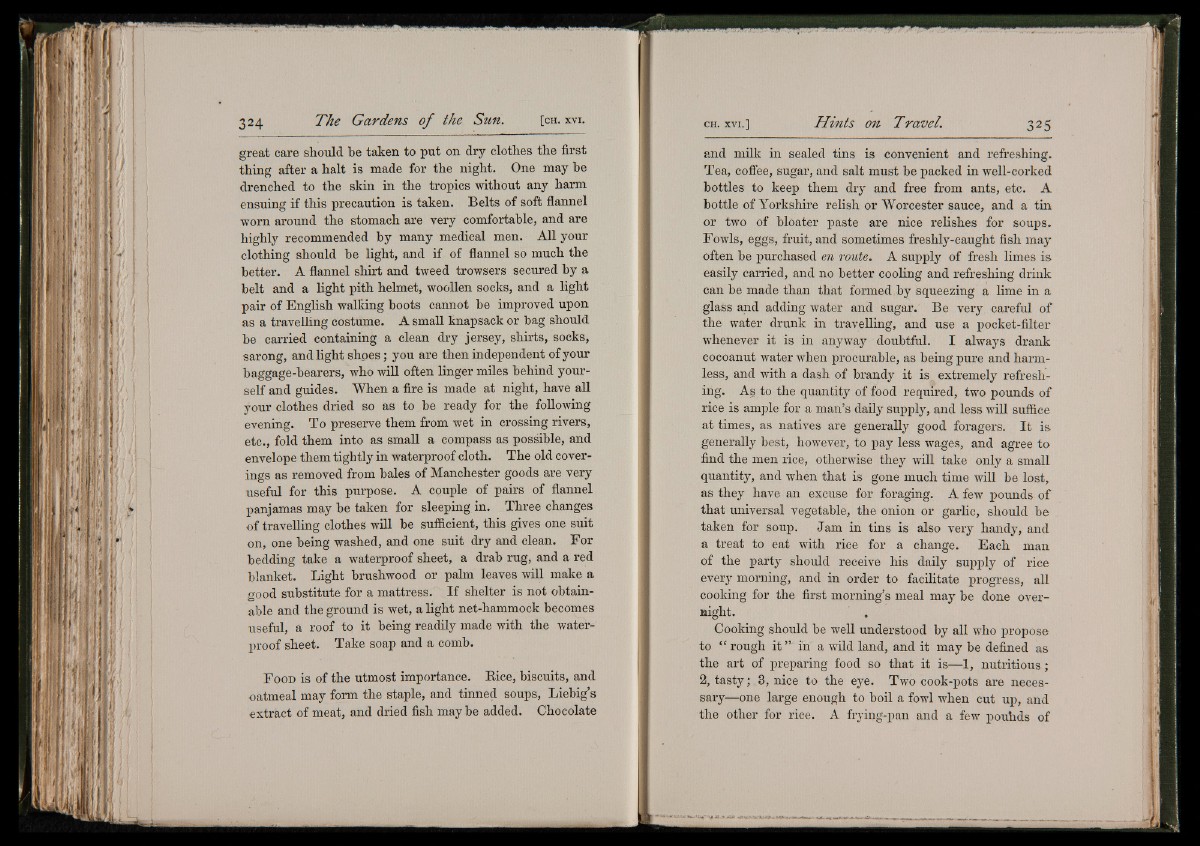
great care should be taken to put on dry clothes the first
thing after a halt is made for the night. One may be
drenched to the skin in the tropics without any harm
ensuing if this precaution is taken. Belts of soft flannel
worn around the stomach are very comfortable, and are
highly recommended by many medical men. All your
clothing should he light, and if of flannel so much the
better. A flannel shirt and tweed trowsers secured by a
belt and a light pith helmet, woollen socks, and a light
pair of English walking hoots cannot be improved upon
as a travelling costume. A small knapsack or bag should
be carried containing a clean dry jersey, shirts, socks,
sarong, and light shoes; you are then independent of your
baggage-bearers, who will often linger miles behind yourself
and guides. When a fire is made at night, have all
your clothes dried so as to be ready for the following
evening. To preserve them from wet in crossing rivers,
etc., fold them into as small a compass as possible, and
envelope them tightly in waterproof cloth. The old coverings
as removed from bales of Manchester goods are very
useful for this purpose. A couple of pairs of flannel
panjamas may be taken for sleeping in. Three changes
of travelling clothes will be sufficient, this gives one suit
on, one being washed, and one suit dry and clean. For
bedding take a waterproof sheet, a drab rug, and a red
blanket. Light brushwood or palm leaves will make a
good substitute for a mattress. I f shelter is not obtainable
and the ground is wet, a light net-hammock becomes
useful, a roof to it being readily made with the waterproof
sheet. Take soap and a comb.
F ood is of the utmost importance. Rice, biscuits, and
oatmeal may form the staple, and tinned soups, Liebig’s
extract of meat, and dried fish may be added. Chocolate
and milk in sealed tins is convenient and refreshing.
Tea, coffee, sugar, and salt must be packed in well-corked
bottles to keep them dry and free from ants, etc. A
bottle of Yorkshire relish or Worcester sauce, and a tin
or two of bloater paste are nice relishes for soups.
Fowls, eggs, fruit, and sometimes freshly-caught fish may
often be purchased en route. A supply of fresh limes is
easily carried, and no better cooling and refreshing drink
can be made than that formed by squeezing a lime in a
glass and adding water and sugar. Be very careful of
the water drunk in travelling, and use a pocket-filter
whenever it is in anyway doubtful. I always drank
cocoanut water when procurable, as being pure and harmless,
and with a dash of brandy it is, extremely refreshing.
As to the quantity of food required, two pounds of
rice is ample for a man’s daily supply, and less will suffice
at times, as natives are generally good foragers. It is
generally best, however, to pay less wages, and agree to
find the men rice, otherwise they will take only a small
quantity, and when that is gone much time will be lost,
as they have an excuse for foraging. A few pounds of
that universal vegetable, the onion or garlic, should be
taken for soup. Jam in tins is also very handy, and
a treat to eat with rice for a change. Each man
of the party should receive his daily supply of rice
every morning, and in order to facilitate progress, all
cooking for the first morning’s meal may be done overnight.
,
Cooking should be well understood by all who propose
to “ rough i t ” in a wild land, and it may be defined as
the art of preparing food so that it is—1 , nutritious;
2, tasty; 3, nice to the eye. Two cook-pots are necessary—
one large enough to boil a fowl when cut up, and
the other for rice. A frying-pan and a few pouhds of